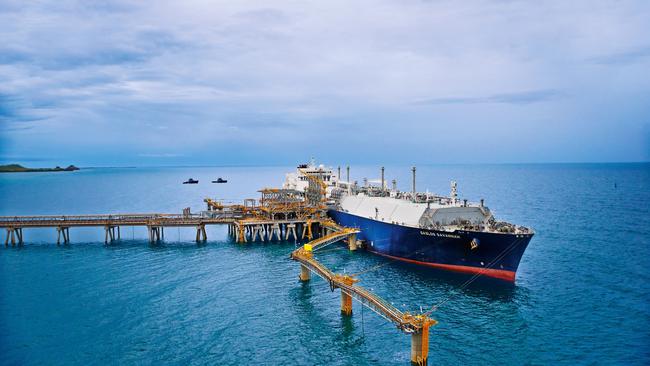Oil Search-Santos $21bn merger in best interest, despite value gap: report
Oil Search approached Santos over boosting its share of a $21bn merger after an independent expert raised concern the company could be handed over too cheaply.

Oil Search approached Santos over boosting its share of a $21bn merger after an independent expert raised concern the company could be handed over too cheaply to its major oil and gas rival.
Under the terms of the deal, Oil Search will own a 38.5 per cent share, which was at odds with an expert’s report on the deal that found it would add 43-44 per cent of the value of the merged companies.
That gap led to Oil Search probing in its talks with Santos whether a change to the merger valuation terms should be considered, sources told The Australian.
Santos rebuffed any suggestion of changing the merger terms, given its view the expert’s report by Grant Samuel was using assumptions inconsistent with modelling and analysts’ consensus in the market that supported the current terms of the tie-up. Oil Search and Santos declined to comment.
While Grant Samuel said shareholders in Oil Search faced a material loss of value under the financial terms of its merger, it ultimately concluded a deal was still in their best interests given bigger funding and development hurdles getting projects off the ground.
Oil Search acting chief executive Peter Fredricson said its recommendation for shareholders to back the deal was based on the broader strategic sense of the deal and not just the valuation.
“The businesses collectively are worth more together than they are standing alone. And I think the 43-44 per cent was a little bit of a red herring in that respect,” Mr Fredricson told The Australian.
“That’s only one pointer in a number. And when you look at market values from 13 or 14 analysts out there, all of them are in that 38 to 39-40 per cent range. None of them are in that 43-44 range.
“So if we were to go to that sort of valuation concept and ignore the other strategic issues, I think that it just doesn’t make sense.”

Still, with the deal requiring the approval of at least 75 per cent of Oil Search shareholders at the December 7 meeting, the expert’s report is likely to fan growing talk that several of its institutional shareholders still harbour concerns over the buyout.
Oil Search shareholder Allan Gray, which owns nearly 5 per cent of the company’s stock, said on Thursday it remained unconvinced by the transaction.
“I think that Oil Search shareholders are being left short here on these terms,” Allan Gray managing director Simon Mawhinney said.
Grant Samuel, hired by the Oil Search board to write the expert’s report, raised issues with the valuation gap. “Even after taking into account the value of the cost savings expected to be realised, the analysis indicates that the merger will result in a reduction in the underlying value attributable to Oil Search shareholders,” the report stated.
“A relative weighting of the valuation issues against the broader benefits of the merger is not straightforward.
“The dilution of underlying value implied by the merger terms is material. There is clearly a risk that the funding and other strategic benefits do not fully compensate shareholders for this dilution.”
The matter remains finely balanced according to Grant Samuel, which ultimately concluded that the merger was still in Oil Search’s interests given the ability of a combined balance sheet to fund the Pikka oil project in Alaska, its belief that estimates of underlying value were “inherently uncertain” in the current environment and “real challenges” in funding growth opportunities on a standalone basis.
Grant Samuel conceded its judgment was highly subjective, but said investors opposed to a deal needed to weigh a likely share price fall if it did not proceed and the need for additional equity support to get growth projects over the line. Oil Search said it continued to unanimously recommend the deal in the absence of a superior proposal.
The two companies have signed a merger agreement, with Santos controlling 61.5 per cent of the beefed-up producer to Oil Search’s 38.5 per cent, a sweetener to the previous 63-37 per cent ratio rejected by Oil Search’s board.
Several investors have also canvassed the possibility of former Oil Search chief executive Peter Botten returning to the company as chairman, replacing Rick Lee, should the company vote down the merger proposal and remain an independent entity.
Shares in Oil Search fell 0.9 per cent to $4.20 on Thursday, while Santos shares dropped 2 per cent to $6.78.



To join the conversation, please log in. Don't have an account? Register
Join the conversation, you are commenting as Logout